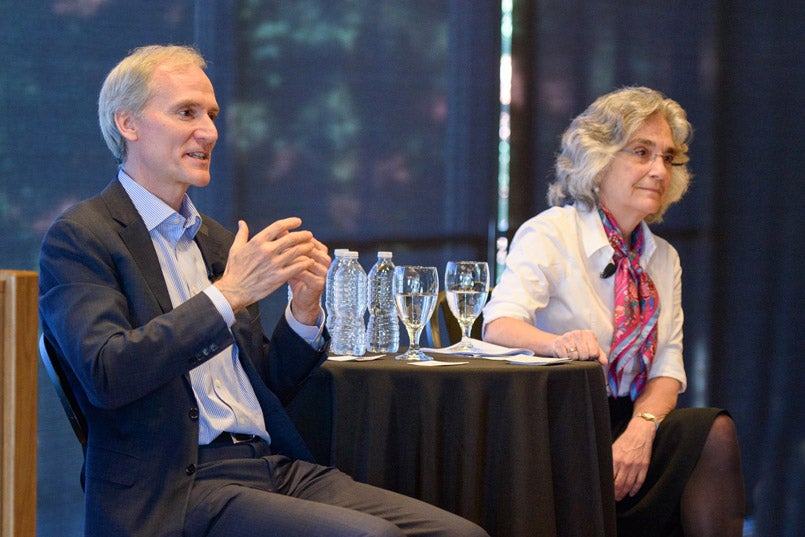February 13, 2018
Expression and inclusion, part 2
In November, Marc Tessier-Lavigne and I authored a blog post on the topic of advancing both free speech and inclusion at Stanford.
In that piece, we affirmed the importance of the free expression of ideas and the full inclusion of people of all backgrounds and perspectives in our community.
We also discussed the fact that while the university cannot mandate respectful expression, we can encourage it and model it. We can bring empathy and deep listening to our interactions, out of a genuine desire to learn from one another.
Multiple recent incidents on campus have underscored the depth of challenge we face in simultaneously ensuring inclusion and free expression. There have been cruel anonymous fliers in a dorm; reports of hateful mail and objectionable speech among individuals in one of our schools; and social media attacks on a faculty member following articles in a student publication. These actions betray deeply held values of our community. Just because a form of expression is constitutionally guaranteed does not mean it is ethical or appropriate.
In these and many other cases, what may be intended as the free expression of ideas has the consequence of making individuals and communities feel they do not belong at Stanford. I want to emphasize to every member of the Stanford community: You DO belong! I know that many do not feel they belong today; Marc and I are committed to making Stanford become a place where you truly know it and feel it. The entire community needs to participate for this to be successful. We have work to do.
Free expression and an inclusive culture will require us all to embrace a higher level of awareness and engagement with others. There is a responsibility, sometimes overlooked, that comes with the commitment to the free expression of ideas in an academic community such as ours. Since my role as Provost focuses on the academic life of the university and the day-to-day experiences of students and faculty, I’d like to share some thoughts on the nature of that responsibility, as I see it.
In our community, we aspire to bring to our interactions a fundamental respect for others – the other members of our community with different backgrounds and points of view, from whom we usually have something to learn. The great opportunity of being at a place like Stanford is to have our horizons broadened, our insights deepened, our discoveries enriched through interaction with those who bring different histories and different perspectives. We can only do this if we engage with each other with interest and respect.
Respect, I believe, requires acknowledging the impact that actions and words can have for other members of our community. Members of our historically underrepresented or marginalized populations can feel vulnerable and under physical threat from actions and words that might be neutral or only mildly uncomfortable to another. Individuals with opinions that don’t conform with the majority can feel isolated or unheard. As members of this community, countering cruel, insensitive or biased speech, and recognizing the damage it may be inflicting on others, is another facet of responsibility that we all need to embrace.
We also aspire at Stanford to persuasive, fact-based discussion. This means holding ourselves to high standards of evidence and intellectual rigor. It means recognizing that facts and opinions are not interchangeable.
I’ve seen and heard some campus interactions recently that probably don’t live up to the ideals we each would like to set for ourselves. For instance:
- Attacking people rather than ideas
- Stating one’s opinion of someone else as a fact
- Quoting someone out of context
- Deliberately ignoring the negative impact of statements or actions on others in the community
- Anonymously posting fliers, particularly in living spaces, that are directed at the identities of others.
But I have also seen many wonderful examples in our Stanford community that advance both expression and inclusion:
- Being sensitive to the negative impact of statements and actions on others in the community
- Acknowledging mistakes
- Apologizing for the unintended impact of a statement or action
- Seeking to understand intent even when there was a negative impact.
Another reality of the world we currently live in is that our discussions at Stanford often circulate well beyond our community. The cases in which members of our community have become subjected to the taunts and hatred of the Internet have been very troubling – no one in our community would desire to inflict that experience on another. We should be asking ourselves what we can do to help prevent it. And we should be working each day not only to reject that kind of discourse and the paths that lead to it, but also to model the desired alternative – the kind of discussion that leads to understanding, compassion and personal growth.
I have great faith in and enormous respect for all of the elements of our incredibly diverse community. In my first year as Provost, it has been a privilege to begin to get to know our community – and I still have so much to learn. Some of that learning comes from in-person discussions with faculty and students; some from structured learning such as the Faculty Senate presentations this past week, led by Dereca Blackmon and faculty in the CCSRE, which were fully devoted to issues of diversity and inclusion; some from discussions with staff who are working to address community issues on a daily and hourly basis.
We have so much more to do together. These are not easy issues – far from it. But they are the issues of our time. They are essential to our success as an institution and to the well-being of our community. As always, Marc and I welcome your thoughts, emails and reflections. We extend to you our heartfelt thanks for all that we have learned from you already.
